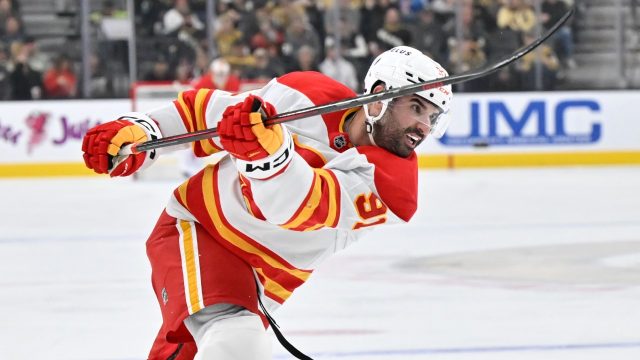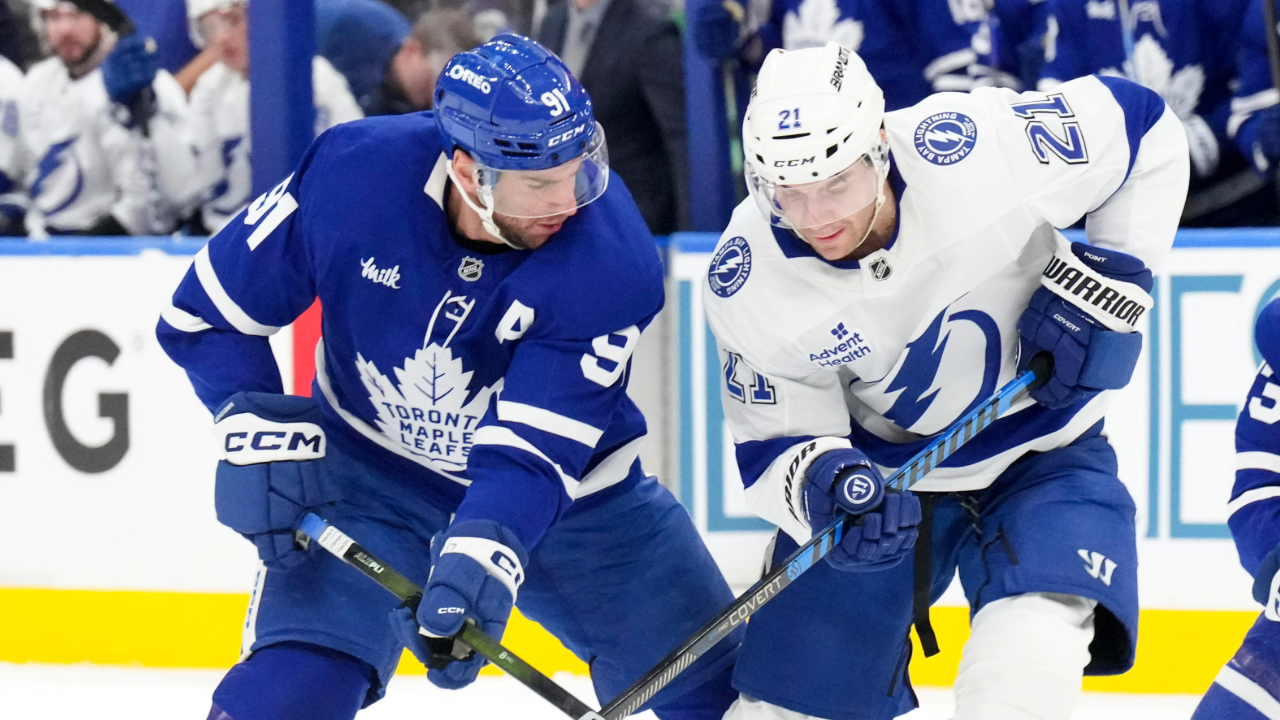
The Friday Four is a collection of thoughts and information on some intriguing player storylines from around the NHL. On deck this week is:
· McDavid’s best move is a short-term extension with the Oilers
· Devils trying to navigate complicated Luke Hughes extension
· Bruins need a major bounce back from Swayman
· Nazar’s deal could be a steal for the Blackhawks
Connor McDavid, Edmonton Oilers
Whether it was the winning goal at the 4 Nations Face-Off, a gorgeous setup to Leon Draisaitl in the Stanley Cup Final or walking through nearly the entire New York Rangers team a few years ago, Connor McDavid has delivered endless dazzling plays over the course of his career. But right now, the only highlight Edmonton Oilers fans want to see is McDavid putting pen to paper.
We’re just mere days away from training camp, and the best player in the world still hasn’t signed a contract extension. In a vacuum, that shouldn’t be cause for concern. McDavid won’t actually become a free agent for almost another year, but the fact that more than two months have passed since McDavid became eligible to extend and the two sides haven’t agreed to terms suggests this likely won’t be a standard long-term extension. He is in a position to name his price and term, and the fact McDavid hasn’t done so yet means he’s pondering different options.
At this point, there’s absolutely no reason to believe those options don’t include the Oilers. McDavid’s desire to win appears to be all-consuming, and there are few better places than Edmonton to accomplish that goal as it stands now. The Oilers have advanced to back-to-back finals with their nucleus of players, and their path to return shouldn’t be as bumpy as some other avenues. The Pacific is arguably the weakest division at the moment, with teams like Anaheim, San Jose, Seattle and Calgary still far from contending. Vancouver is a question mark, and the Oilers have had the Los Angeles Kings’ number in the past four post-seasons. Vegas will provide a real challenge, but the reality is the journey back to a deep playoff run figures to be much easier in the Pacific than it would be in the Central or Atlantic, for example.
The Oilers roster is in good shape, too. Sure, it has flaws, but you won’t find a better running mate than Leon Draisaitl, and there is enough talent with players like Evan Bouchard, Zach Hyman and Ryan Nugent-Hopkins to build around for a while still. McDavid’s next contract isn’t so much a question of team, but rather one of money and term.
In this case, the money probably isn’t as complicated as the term. McDavid’s main goal is to win, so he’s likely willing to take a little less if it helps the Oilers stay flexible with the cap and continually make improvements to the roster. The term is where it gets interesting. We’re used to players taking max term at McDavid’s age, but that wouldn’t make sense for him if he’s solely focused on a championship. There’s no telling what the competitive landscape will look like in the NHL in three or four years, which is why McDavid shouldn’t extend for more than one or two seasons now.
The reasons why Edmonton is a good destination today may not hold true in a few years. The Pacific could be a much tougher division at that point, and the Oilers’ roster might face challenges as well. By the 2027-28 campaign, Hyman and Nugent-Hopkins will be in their mid-thirties and likely starting to regress.
Key contributors on the back end, like Mattias Ekholm, Jake Walman and Brett Kulak aren’t signed beyond this year, and Darnell Nurse’s contract may really become an anchor soon. Not to mention the goaltending struggles, which the Oilers have yet to remedy.
McDavid and Draisaitl have been exceptional in the post-season, and Edmonton still hasn’t been able to win it all. It’s hard to imagine that either player has any more to give. If Edmonton is going to be a real contender a few years from now, McDavid and Draisaitl are going to need a lot more help. If it isn’t provided, a short-term extension keeps McDavid flexible to explore better opportunities.
Even though it’s probably not his top priority, there is also a financial reason for McDavid to only extend for a year or two right now. The largest percentage of the salary cap a player can sign for is 20 per cent and with the cap jumping big time over the next few seasons, McDavid could increase his AAV every year on a series of one-year deals. He could theoretically become the league’s highest-paid player and maintain a hold on that status by going this route.
It’s rare to see a player of McDavid’s calibre take a short-term deal, but not so in other sports like the NBA. LeBron James frequently took shorter deals to try and maximize earnings and leave himself the flexibility to find the best spot to win. McDavid now finds himself in a similar position, where his value is so immense to any franchise that he can write his own ticket and map out the course for the rest of his career.
If McDavid does go down this road, Oilers fans shouldn’t hit the panic button. It doesn’t necessarily mean he’ll leave in a couple of years, and it would put pressure on the organization to get better. A short-term extension could be a message from McDavid to the team that says: if you fix the goaltending, improve the forward depth and solidify the blue line, there’s no reason not to stick around.
McDavid may hold all the cards, but it’s in the Oilers’ hands to make sure he stays long-term.
Luke Hughes, New Jersey Devils
The New Jersey Devils and RFA Luke Hughes appear to be at an impasse when it comes to his next contract.
Reports surfaced last week that the Devils are hoping to lock Hughes up for eight years or go the bridge route for three years, but the defenceman wants to meet in the middle for a very specific reason. Hughes is eyeing a five-year pact, which would make him an unrestricted free agent the same year his brother Jack would hit the open market. The Devils probably want to avoid this scenario, but if Hughes gets his way, it could make for a very interesting summer in 2030.
Let’s just assume for a second Hughes lands his five-year deal, and he and his brother would both be free agents at the same time. The Devils would have to try and extend each of them before they hit the market and ensure they have enough cap space to do so. Even with how high the cap will likely be by then, it would be a tricky task for any team to sign two substantial contracts at the same time.
If both players opted to test free agency, they’d almost certainly come as a package deal, and that situation could be even more challenging. You rarely see teams land two big-name players in the same summer simply because of a lack of cap space, but if it looks like the Hughes brothers are preparing to test free agency simultaneously, you can bet organizations are going to try and create the flexibility to secure them both.
This doesn’t even take into account Quinn Hughes and his future plans. It’s all currently speculation, but some believe all three brothers would like to play together at some point and why wouldn’t they? Quinn has two more years left on his current deal with the Vancouver Canucks and it remains to be seen how that ends up. Vancouver will likely want to know what his future plans are next summer so they can have a contingency plan in place if he isn’t planning to re-sign. If the trio do ultimately end up on the same team eventually, it’s likely going to take some creative cap maneuvering to make it happen.
The Boston Bruins found themselves in unfamiliar territory at the end of last season. Boston finished tied for last in the Eastern Conference and missed the playoffs for the first time since the 2015-16 campaign.
A big reason for that was that the Bruins didn’t get the goaltending they’ve relied on so much in recent years. Jeremy Swayman posted the worst numbers of his career, with an .892 save percentage and a goals against average over three. It was Swayman’s first real test with a full starter’s workload, and he didn’t pass. Part of the problem was missing training camp due to a contract negotiation that dragged on until early October, and Swayman looked a step behind all season.
Heading into 2025-26, Swayman will now have the benefit of a full camp in hopes of regaining the form that earned him an eight-year, $66 million contract. He’ll have to in order to justify that deal. Earning more than $8 million per year makes Swayman one of the highest-paid goaltenders in the league, and it’s hard to have success when you allocate that much of your cap to a netminder who’s not performing up to their standards.
If Swayman can bounce back, though, the Bruins have a real chance to surprise some people. When he’s at his best, there aren’t too many goalies who can play the position better than Swayman, as his 2024 playoff run would attest. Swayman finished with a .933 save percentage and gave the Florida Panthers all they could handle in the second round.
Expectations for the Bruins heading into this season are probably as low as they’ve been in quite some time, and there’s a different feel around the team. Brad Marchand’s departure at last year’s trade deadline was the last piece of the old Boston guard to move on, and David Pastrnak, Charlie McAvoy and Swayman are now the official faces of the team. If the Bruins hope to contend for a playoff spot, they’ll need Herculean efforts from all three, and Swayman will not only have to bounce back, but perhaps take his game to an even greater level than it’s been before.
Frank Nazar, Chicago Blackhawks
It only took Frank Nazar 56 games to earn a very lucrative contract extension from the Blackhawks. The 21-year-old signed a seven-year deal worth $46.13 million, making it the largest pact for a player with that little experience.
It’s certainly a small sample size, but it’s a good bet by Chicago. Nazar still has some developing to do, though you can already see he’s only scratching the surface of his abilities. The Blackhawks forward finished last season on a tear, scoring nine points in his final eight games. He also started to earn more of the coaching staff’s trust. In December, Nazar was averaging less than 14 minutes of ice time per game, but by April, that had jumped to more than 17 minutes a night. Nazar then carried that strong finish to the NHL season over to international play, where he helped the United States win the world hockey championship for the first time since 1933, tallying 12 points in 10 contests at the tournament.
Chicago is also trying to get ahead of the curve with this contract. With the cap skyrocketing over the next few years, Nazar’s $6.59 million cap hit may seem a tad risky now, but could age very well in time. In three years, the cap will rise all the way up to $113.5 million, so if Nazar’s ceiling is even only a 60-point player, it’s still really good value. If he ends up scoring at a point per game, then it’s an absolute steal for the Blackhawks.
Chicago will be hoping for the latter. They’ve had a difficult time finding talent to play with Connor Bedard externally, so Nazar might be a temporary internal solution. If Nazar can hold down the second line centre spot as well, that would take some of the pressure off Bedard when it comes to playing important minutes, and the duo could team up on the power play, where the Blackhawks actually had a top-10 unit last season. There hasn’t been much to celebrate in Chicago over the past few years, but the Nazar contract is a small win.






